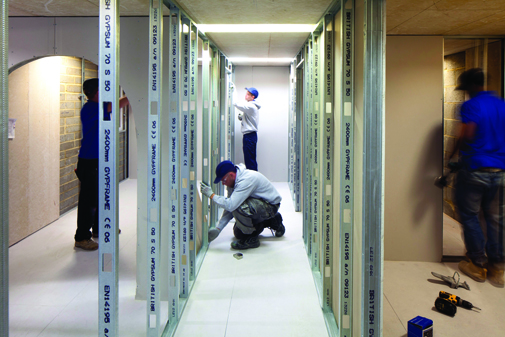Demand for specialist contractors is growing and skilled labour is at a premium. The former managing director of British Gypsum, Michael Jones, who as Master, leads one of the oldest City of London livery companies that supports training and skills development. Mr Jones spoke to business leaders and advocated a sea change in the approach to the provision of apprenticeships.
Resources is a hot topic, and a key question challenging the finishes and interiors sector is whether we are producing young craftsmen and women of the right calibre to support current and future growth in the construction sector?
The fact that we have only recently emerged from the worst recession in living memory and employers are already speaking of skills shortages, suggests that we are not.
So where are these potential young craftspeople?
Comparing the two strongest economies in Europe, namely Germany and the UK, total unemployed during the 12 months to November 2014 in Germany was five per cent and in the UK it was slightly higher at 5.8 per cent. Youth unemployment, however, showed a significant variation. In Germany youth unemployment in this period was 7.4 per cent but in the UK, 16.3 per cent; nearly three times the national average.
In Germany, vocational training commands a high degree of acceptance and social respect. There is an awareness that systematic vocational training is desirable and for the public good.
Whereas in the UK, there has been, and still is, an aspirational view that a notional 50 per cent of young people should go to university. In the UK, university graduates often emerge, in debt, with qualifications that too few employers find to be sufficiently worthwhile, or at least have any interest in, and struggle to find meaningful employment.
Recent House of Commons library reports state that 40 per cent of large employers in the UK offer apprenticeships, whereas only five per cent of microbusinesses offer them. Microbusinesses, defined as those with fewer than nine employees, constitute the vast majority of the finishes and interiors profession.
So, while companies like British Gypsum provide worthwhile and valuable support to training colleges and our own Plaisterers’ Livery Company provides support for training excellence in such colleges, we need a sea change in political approach to the provision of apprenticeships in an industry such as the finishes and interior sector which is dominated by microbusinesses.
Our economy needs less in the way of academic degrees but a system more focused on genuine academic meritocracy, gaining worthwhile degrees in employment-relevant subjects while maintaining sensible scope for education in the arts, and much, much more in the way of wide-scale apprenticeships. A step change in this area would then provide real and meaningful employment opportunity for Britain’s youth.
The introduction of apprenticeship training agencies might have been expected to have gone some way towards satisfying this need in terms of systematic vocational training in the context of SMEs, especially microbusinesses. However, so far as plastering and drylining apprenticeships are concerned, there is no real evidence of any meaningful impact in this regard.
This last government has done much to improve the number of apprenticeships being created after decades of decline. But we now need a more visionary role to be undertaken by a future government with greater state involvement in the provision of apprenticeships in industries that mainly comprise microbusinesses, but are collectively significant in terms of national importance.
By working in partnership, construction product manufacturers such as British Gypsum; contractors who employ craft and tradesmen; and the Worshipful Company of Plaisterers, representing the heritage and interest of the craft, can continue to do much to support our industry into the future.
Michael Jones
Master
The Worshipful Company of Plaisterers
www.plaistererslivery.co.uk


